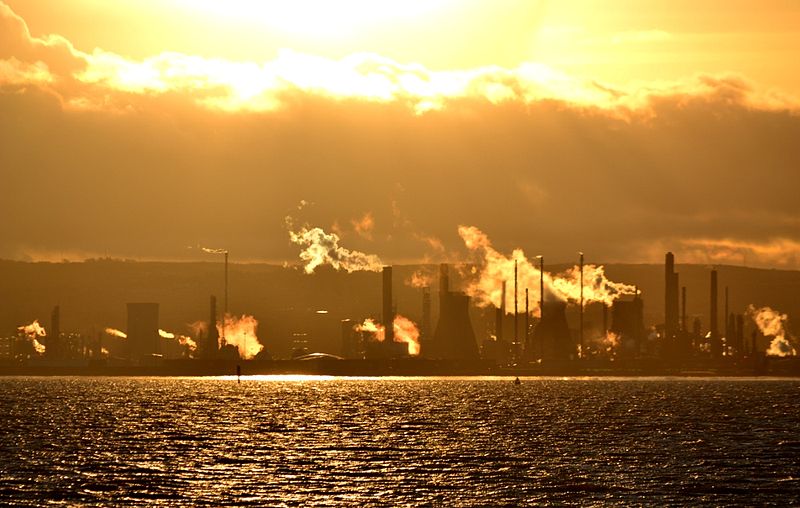INEOS is today challenging the Scottish Government over its decision to ban fracking. But much more is at stake than the status of the UK’s newest fossil fuel industry.
After introducing a moratorium in 2015, ministers announced the prohibition in October 2017 which was subsequently endorsed by a vote of MSPs. The company, which has faced local opposition in the rest of the UK is trying to overturn the Scottish ban which doesn’t involve legislation but is an instruction to local authorities not to consent planning for any fracking-related activities.
The case comes soon after the Scottish Government successfully faced-down a lengthy legal challenge to their Minimum Pricing for Alcohol legislation from the Scotch Whisky Association. It raises significant issues about the nature of power in democracy, the role and status of science, and the power of corporate lobbying.
There is also a constitutional aspect to this debate, as INEOS’ claim is based on the idea that this ban is unlawful as the licences were originally issued by the Westminster government.
Not only does INEOS want the ban lifted, it is seeking compensation for their investment in fracking infrastructure in Scotland.
INEOS has a poor track record of pollution with multiple incidents reported at their Grangemouth petrochemical plant with gas leaks, flaring and unplanned sulphur discharges resulting in the Scottish Environmental Protection Agency (SEPA) giving it one of its lowest performance ratings. Documents released due to a freedom of information request revealed that workers from the plant had to be evacuated in 2016.
The company has also been accused of an assault on civil liberties after it took out a nation-wide injunction against protesters. The injunction applies more widely than injunctions sought by previous oil and gas companies before by covering routes to the proposed exploration sites and to activities undertaken by INEOS employees and members of its supply chain. This includes any depot, equipment, people and operations. The injunction significantly increases the risk of protesting against fracking.
Fracking and Climate Commitments
Friends of the Earth Scotland have submitted a public interest intervention in INEOS and Reach Coal Seam Gas’ judicial review of the Scottish Government’s decision to ban fracking.
The intervention argues that not only is the ban on fracking lawful, but that the Scottish Government is arguably required to ban fracking in order to meet Scotland’s legally binding climate change commitments.
Analysts have shown most of the world’s fossil fuel reserves should remain in the ground in order to limit global warming to well below two degrees, as per the Paris Agreement.
Public interest interventions in the Court of Session are very rare, and this is the first time such an intervention has put forward arguments in defence of the environment.
As such it represents an important step forward for Scotland in terms of environmental rights and access to justice for the environment, enshrined in international law by the UNECE Aarhus Convention.
Friends of the Earth Scotland’s Head of Campaigns Mary Church said in a statement:
“Our intervention argues that the Scottish Government is required to ban fracking so as to urgently cut greenhouse gas emissions from fossil fuels, in line with legally binding climate targets.”
“We are confident that the process to ban fracking was robust and fair, and we hope that the courts will find against INEOS. A two-year process looked at mountains of scientific evidence that spoke of the risks of the unconventional oil and gas industry to our environment, climate and people’s health. There is overwhelming support for the ban from communities on the frontline of this industry, people the length and breadth of Scotland, and almost all the parties at Holyrood.”
Democracy
The case is being seen by campaigners as a landmark battle of corporate power versus democracy. At stake, they argue, is the ability to not only stop the most polluting forms of fossil fuel extraction, but also the Paris Agreement itself and the wider issue of the role of public consultations in the formation of government decisions.
The Scottish Government announced an ‘effective ban’ on fracking on 3 October 2017 following a 33 month moratorium which included an extensive evidence gathering process and a public consultation to which 99 percent of the 60,000 respondents opposed fracking.
The Scottish Parliament voted to support and strengthen the Scottish Government’s ban on 24 October 2017, with Labour, the Greens and Liberal Democrats voting with the Scottish Government.
Friends of the Earth Scotland is represented by amongst others the Scottish law firm Balfour+Manson.
Balfour+Manson solicitor Sindi Mules told DeSmog UK:
“Over 60,000 people engaged in the consultation on fracking before Ministers implemented the ban, with 99% opposed to the industry, demonstrating the tremendous importance of this case. We are delighted to be involved in this intervention which puts forward important legal arguments on climate change, and trust it ensures a fuller picture of the context around the ban is put before the court.”
“Public interest interventions in the Court of Session are rare, and this is the first time such an intervention has put forward arguments in defence of the environment. As such it represents an important step forward for Scotland in terms of environmental rights and access to justice for the environment, enshrined in international law by the UNECE Aarhus Convention.”
For more more on INEOS, see its full profile in DeSmog UK’s Disinformation Database.
Image: Caledonian Mercury Creative Commons
Subscribe to our newsletter
Stay up to date with DeSmog news and alerts






